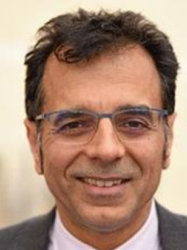Overview
Collaborators
Professor Lalvani’s research programme addresses the world’s most serious respiratory infections: tuberculosis and pandemic influenza. His research has been published in over 120 scholarly articles and book chapters, with over 8,000 citations in the medical and scientific literature.CLINICAL AND PUBLIC HEALTH IMPACTClinical Practice: Professor Lalvani’s first translational research output, IGRA (T-SPOT.TB™) transformed clinical practice, shaped TB control policy internationally and provided health services with CDC and EuroCDC-endorsed rapid tools to cost-effectively deliver a TB elimination strategy through targeted preventative therapy of latent TB. Deployment of IGRA prevents diagnostic delays and unnecessary overtreatment - and is much preferred by patients.Policy and Guidelines: Having created the evidence-base underpinning the national and European guidelines endorsing IGRA (2006-2010), Professor Lalvani’s went on to develop a new evidence-based NICE-endorsed policy (2011) for immigrant TB screening which has set the new national clinical agenda on tackling TB in the EU.MAJOR SCIENTIFIC DISCOVERIES Professor Lalvani has generated fundamental insights into immunity to intracellular pathogens and the action of TB, malaria and flu vaccines, including the following firsts. These discoveries significantly impacted development of new TB and malaria vaccines and transformed our understanding of the natural history of TB infection. 1) Identification of a new mechanism of action of BCG vaccine (2005) which has substantially impacted development and evaluation of new TB vaccines. 2) Identification of transient, self-resolving TB infection (2006) which has transformed our understanding of the natural history of TB infection and protective immunity. 3) Identification of regulatory T cells in TB (2006). 4) Characterisation of T cell cytokine profiles that reflect TB pathogen burden (2007). 5) Development & validation of a novel high-throughput platform for sensitive enumeration of polyfunctional antigen-specific T cells (2010). 6) Discovery of a new highly immunodominant TB vaccine target, EspC (2011). 7) Identification of immunological memory in CD1-restricted T cells indicating that this unconventional T cell subset belongs to the adaptive immune system and is amenable to vaccination. 8) Discovered the role of vitamin D deficiency in promoting extrapulmonary dissemination in TB (2012). 9) Identification of HLA class I-restricted CD8 T cells specific for TB (PNAS, 1998, 331 citations). 10) Identification of a cellular immune correlate of protection against symptomatic pandemic influenza (2012). 11) Discovery of rapid effector function in virus-specific CD8 T cells after viral clearance (J Exp Med, 1997, 606 citations).
Prof Lalvani regularly communicates the health implications of his high-impact research papers to the public via interviews on BBC TV News (Lancet 2003), international broadcast media (Lancet 2003, Lancet 2005), BBC Radio and national print media (Lancet Infectious Diseases 2011), BBC News Website (PNAS 2011). Anchor-expert for BBC World’s The Health Show that focused on TB (2011) and a BBC Radio 4 “File on 4” documentary (2012) that focussed on my work setting the new national agenda for TB screening (Eur Resp J 2010; Lancet Infect Dis 2011). Public speaker at British Festival of Science, Birmingham, 2010 and the Festival of London Public Balloon Debate at the Wellcome Collection, 2009.


